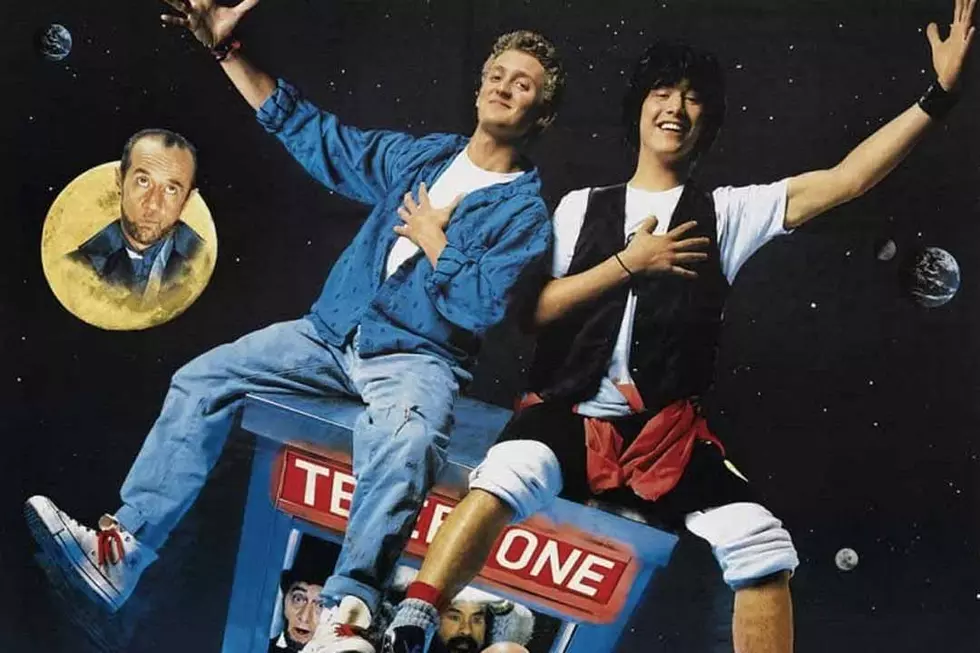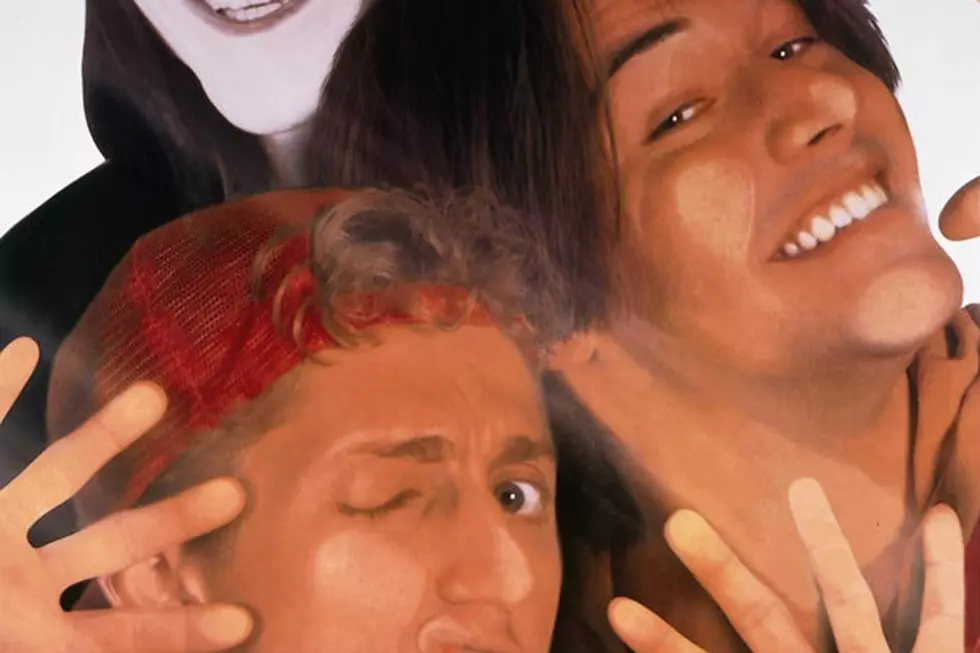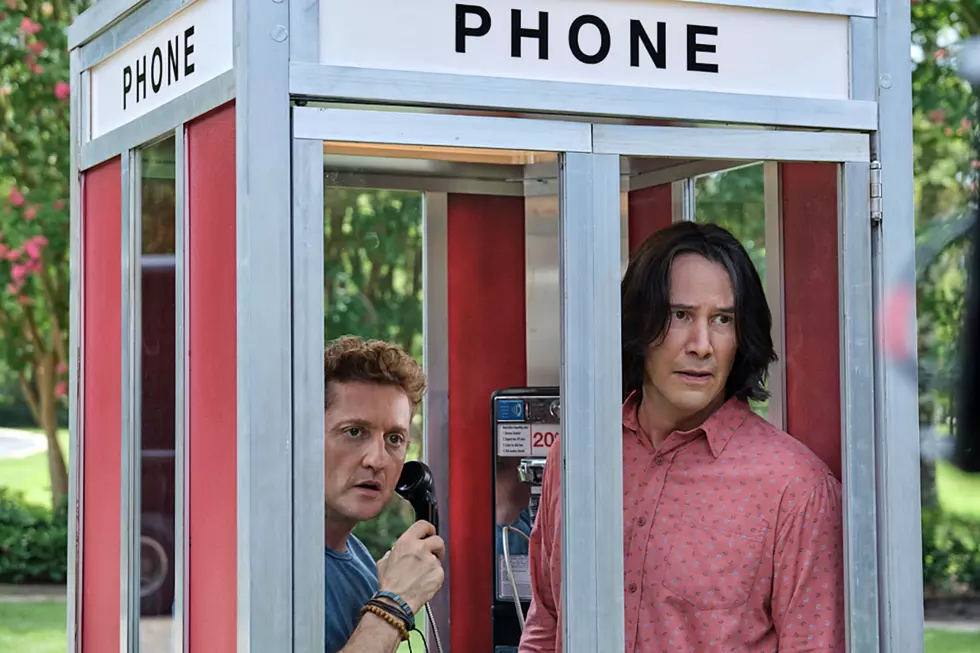
How ‘Bill & Ted’s Excellent Adventure’ Made History Not So Bogus
What many people probably forget about 1989's Bill and Ted's Excellent Adventure is just how strange, innocent and charming the decade was. And just how deeply the movie sowed the seeds of our contemporary moment.
Bill & Ted's Excellent Adventure tells the story of two slackers named Bill S. Preston, Esq. (Alex Winter) and Ted "Theodore" Logan (Keanu Reeves) from San Dimas, Calif., a city about 30 miles east of Los Angeles. They embody most of the stereotypes much of the rest of the country had about Southern California in the '80s: They are remarkably dimwitted, speak in a stoner/surfer dialect full of exclamatory adjectives like "excellent" and "whoa," dress in flannel shirts and weird shorts, have a two-person heavy metal band called "Wyld Stallyns" but don't know how to play their guitars, like to quote heavy metal and classic rock and idolize Eddie Van Halen, who grew up in nearby Pasadena.
But Bill and Ted have a problem. The only way they can pass their school history class is to get an A+ on the final presentation, and if they don't do that, Ted's father – a strict police captain – is going to send him to a military school in Alaska and break up their band.
Things get even more complicated when they are visited by a man named Rufus from 600 years in the future (George Carlin) who informs them that the music of Wyld Stallyns is the basis for all future civilization. If they fail the presentation and the band is broken up, the future is doomed. Fortunately, Rufus has a solution: He gives them a time-traveling phone booth so they can collect historical personages for their presentation.
So, Bill and Ted embark on their adventure. They gather Billy the Kid, Socrates, Napoleon, Genghis Khan, Joan of Ark, Freud, Beethoven and Abraham Lincoln and bring them back to San Dimas, where some minor high-jinks ensue. Bill's younger brother ditches Napoleon instead of keeping an eye on him and the emperor ends up in a water park. The others go to a mall and wreak havoc: Joan of Arc (who's played by Jane Wiedlin from the Go-Go's) commandeers an aerobics class, Genghis Khan gets into a skirmish with security guards, Billy the Kid and Socrates try to pick up girls and Abe Lincoln gets accused of stealing an Abe Lincoln costume. They all end up in jail.
With time running short, Bill and Ted have to mastermind a jail break and get the historical figures to the auditorium. The movie ends with a triumphant presentation in which each person demonstrates what he or she is famous for, and Bill and Ted show they have mastered some of the details of their new friends' lives and can finally pronounce their names more or less correctly. Bill and Ted get their A+ and the entire future of humanity is saved.
Although the film is a slacker comedy like Harold and Kumar Go to White Castle or a very gentle version of The Hangover, it started as something a bit darker. Ed Solomon and Chris Matheson's original screenplay was centered on younger, less charismatic metalheads who borrow a friend's time-traveling van. They manage to kill Julius Caesar, help a caveman invent fire so they can smoke a joint and kidnap Hitler, bringing him back to San Dimas.
Once this idea got smoothed down a bit, director Stephen Herek embarked on casting, running through Pauly Shore, River Phoenix, Sean Penn and Brendan Fraser before setting on Reeves, in his major breakout role, and Winter, an experienced stage actor who started performing on and off Broadway as a teenager. The two developed their characters into a pair of lovable goofballs complete with synchronized expressions of amazement and a signature air-guitar celebration. Carlin signed on when Eddie Van Halen – the first choice for the role of Rufus – proved too expensive and then everything else fell into place.
Watch the Trailer for 'Bill & Ted's Excellent Adventure'
Even though it spawned sequels, two TV shows, comics from both DC and Marvel and several video games, the film is probably best remembered for its bevy of quotable lines - from "Strange things are afoot at the Circle-K" to the description of Genghis Khan as "The dude who, 700 years ago, totally ravaged China and, two hours ago, totally ravaged Oshman's Sporting Goods." It also has some fun with both real history and movie history, including a scene where Sigmund Freud holds a corn dog that slowly sags as he gets rejected by a girl at the mall, one where Bill and Ted misunderstand the meaning of the phrase "Put them in the Iron Maiden!" and references to everything from Dr. Who to Back to the Future.
Beneath all of this runs the combination of uneasiness and optimism that defined the '80s. Ted's father, the tough police captain, presages Chris Cooper's role as the repressed disciplinarian in American Beauty from a decade later and reflects the Reagan era's obsession with the authoritarian nature of the adult bureaucratic world. In a similar vein, one of the students who precedes Bill and Ted in the high school history presentations is a black girl who notes that the world of Marie Antoinette is similar to ours in the way it features a vast gap between the haves and the have-nots. And the quiet implication of the whole movie is that a better, truer understanding of history is one of the main methods we have of improving our fates.
Bill and Ted have two mottoes that become both the motif of the film and a slogan of future society: "Be excellent to each other" and "Party on, dudes!" These verities are matched with a touching faith that it is the enthusiasm, kindness and gentleness of youth that still sounds like a plan for generations going forward.
Everything We Know About 'Bill and Ted Face the Music'
More From Ultimate Classic Rock









